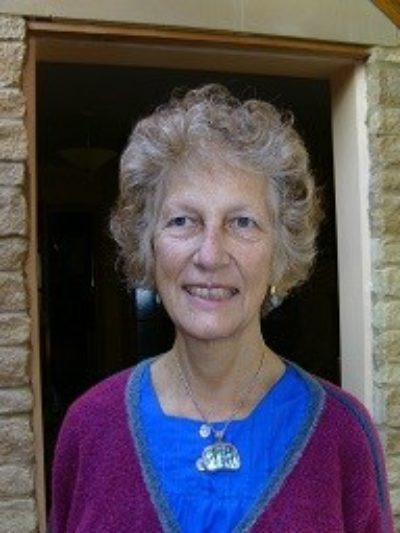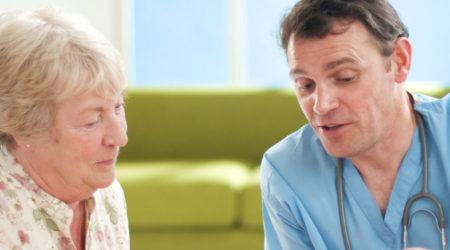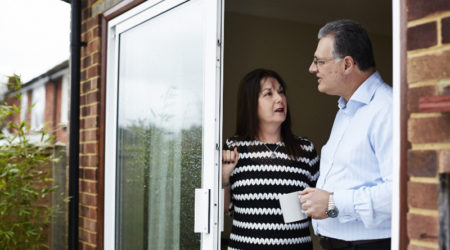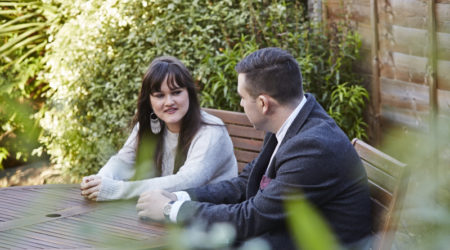



Dave & Jill
Dave's story of his wife Jill's pancreatic cancer, she was diagnosed in 2011.
Our world fell apart when the phone rang at 8.45am one cold December morning. It was the hospital. ‘I know, we’ve got an appointment with the lymphoma specialist this afternoon.’ ‘You’re to see another doctor instead’ ‘Why?’ ‘She’s a pancreatic cancer specialist’.
The lead up to a diagnosis
Barely four months earlier, in August 2011, Jill had stomach pains. She put this down to over eating; our local GP thought it was ‘probably’ a hernia – an understandable diagnosis. After a month with no change the GP referred her to hospital as ‘urgent’. Ultrasound and endoscopy showed nothing; she then had a four week wait for a CT scan. The scan showed swollen lymph nodes in her stomach; initially thought to be lymphoma, a very treatable cancer. Another four weeks went by before she had a biopsy which showed the lymph nodes were secondaries from the primary tumour in the pancreas. Those two months between initial ‘urgent’ referral and diagnosis were the worst time for both of us. I watched Jill in perpetual pain, unable to eat or sleep properly and losing two stone in two months. I went bananas trying to find out when the next scan/ biopsy would be, querying delays and total lack of information.
Feeling helpless
When she was diagnosed her doctor explained the bleak outlook; mean survival time six months, too advanced to be operable, palliative chemotherapy might extend her life by a month or two. At least the strong painkillers now prescribed stopped the pain and her appetite returned. As a husband, what could I do to help? I’m an engineer, used to fixing problems, but at first I felt helpless. We spent a lot of time with Mr Google and real life friends gathering information. I was shocked to read that this ‘relatively rare’ cancer kills nearly 8000 people a year in the UK – nearly four times the number killed on the roads – yet there is so little known about it.
Jill read ‘Anticancer’ by David Servan-Schreiber and this immediately made sense to me. We understood that the ‘6 months’ prognosis was purely statistical. Jill never smoked, drank moderately, had a healthy diet and was a keen cyclist and walker. Obviously she shouldn’t have this disease, but if anyone was going to be in the 50% who last more than 6 months or 20% who lasted more than a year it was her.
Helping Jill
So what did I do? Found new recipes and did the cooking, the washing up, laughed and cried with her, planned for what time we had. I went to her appointments and LISTENED -consultants talk to you about your terminal disease, but you come out with nothing in writing, going ‘What did she say? Are they going to do something else? When?’ it’s really difficult to cope with – you need a second person to check what they say.
Meanwhile the chemotherapy routine – 1 day a week, 3 weeks on, 1 week off – went well. The ‘palliative’ dose did not have severe side effects; some nausea and tiredness but she was able to eat normally, go for walks, see friends and life was ‘ok’.
Jill decided to have a ‘celebration’ of her life while she was still alive. She had a great gift for gathering and maintaining friendships, so in March over 100 people from all corners of her life descended on the Blue Boar and sang songs, read poems, talked about Jill’s life (see Youtube ‘jillychrissy’). This was an amazingly brave and positive event which meant so much to Jill.
After 3 months a scan showed the chemotherapy had reduced her secondaries, so we decided to go to France, where we have a second home. This worked well, in that we rapidly set up further treatment and were optimistic that we could enjoy the summer. There was an immediate contrast with the NHS; waiting lists are almost unknown; you see a specialist within a few days, scans are next day if urgent, a few days if not. Unfortunately the pain in her hip – ‘probably arthritic’ they said in Oxford – got worse. We saw a ‘rheumatologist’ – joint specialist – who had Jill in next day for bone scans which confirmed it had spread to her hips and spine. From then on she got stiffer, eventually bedbound and died late July – 7 months after diagnosis, less than a year after initial pains.
A special last few months
Those last few months, though brief, were very special. We enjoyed life in the sun; had a weekend in the Costa Brava, entertained many friends from near and far, talked a lot about our happy 15 years together and left nothing unsaid. We became really close, which made the inevitable parting more painful than I imagined, but I look back on that time with a mix of love, sadness and incredible pride at Jill’s positive attitude. One thing I would carry forward is that when you get this ‘terminal’ diagnosis and people say ‘there’s nothing to be done’ the quality of life in what time you have assumes massive importance, so ‘palliative’ care, ie how much pain free time you have, is vital.
November 2012




